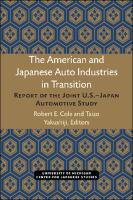The American and Japanese Auto Industries in Transition
Report of the Joint U.S.–Japan Automotive Study
Contributor(s)
Cole, Robert E. (editor)
Yakushiji, Taizo (editor)
Language
EnglishAbstract
This report was prepared for the Policy Board by the U.S. and Japanese research staffs of the Joint U.S.–Japan Automotive Study under the general direction of Professors Paul W. McCracken and Keichi Oshima, with research operations organized and coordinated by Robert E. Cole on the U.S. side, in close communication with the Taizo Yakushiji on the Japanese side. [preface] In view of the importance of stable, long-term economic relationships between Japan and the United States, automotive issues have to be dealt with in ways consistent with the joint prosperity of both countries. Furthermore, the current economic friction has the potential to adversely affect future political relationships. Indeed, under conditions of economic stagnation, major economic issues inevitably become political issues. With these considerations in mind, the Joint U.S.–Japan Automotive Study project was started in September 1981 to determine the conditions that will allow for the prosperous coexistence of the respective automobile industries. During this two-year study, we have identified four driving forces that will play a major role in determining the future course of the automotive industry of both countries. These are: (1) consumers’ demands and aspirations vis-à-vis automobiles; (2) flexible manufacturing systems (FMS); (3) rapidly evolving technology; and (4) the internationalization of the automotive industry. [exec. summary]
Keywords
Industry and industrial studiesDOI
10.3998/mpub.18623Publisher
University of Michigan PressPublisher website
https://www.press.umich.edu/Publication date and place
Ann Arbor, 2020Grantor
Imprint
U of M Center For Japanese StudiesClassification
Industry and industrial studies


 Download
Download